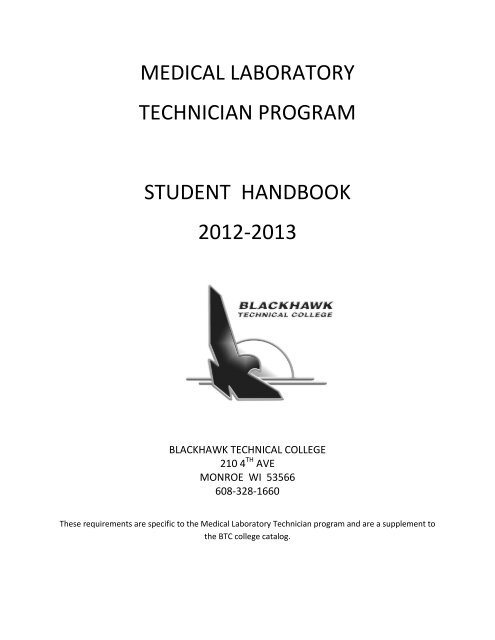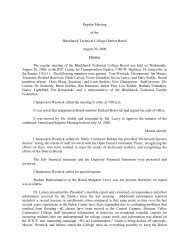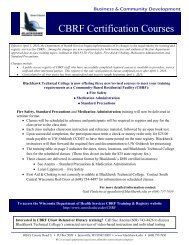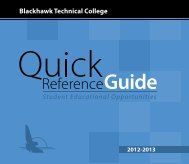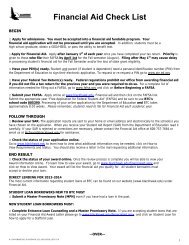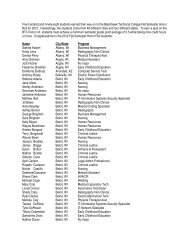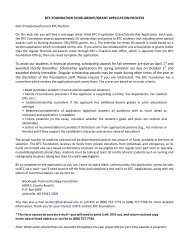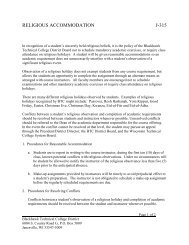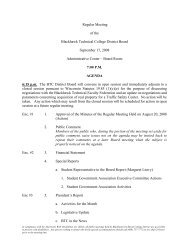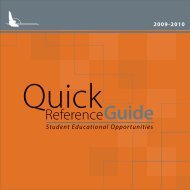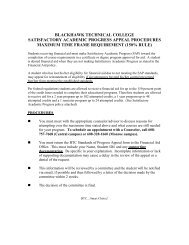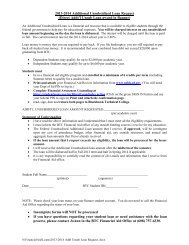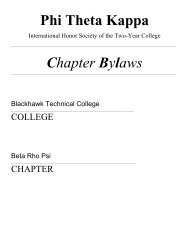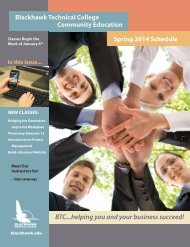medical laboratory technician program student handbook 2012-2013
medical laboratory technician program student handbook 2012-2013
medical laboratory technician program student handbook 2012-2013
Create successful ePaper yourself
Turn your PDF publications into a flip-book with our unique Google optimized e-Paper software.
MEDICAL LABORATORY<br />
TECHNICIAN PROGRAM<br />
STUDENT HANDBOOK<br />
<strong>2012</strong>-<strong>2013</strong><br />
BLACKHAWK TECHNICAL COLLEGE<br />
210 4 TH AVE<br />
MONROE WI 53566<br />
608-328-1660<br />
These requirements are specific to the Medical Laboratory Technician <strong>program</strong> and are a supplement to<br />
the BTC college catalog.
TABLE OF CONTENTS<br />
Organizational Chart …………………………………………………………………………………………… Page 1<br />
NAACLS Information …………………………………………………………………………………………… Page 2<br />
Program Goals ……………………………………………………………………………………..……………. Page 3<br />
Essential Requirements……… …….…….………………………………………………………………… Page 4<br />
MLT Course Descriptions …….……….…….………………………………………………………….….. Page 5<br />
MLT Course Descriptions .………..……….….……………………………………………………………. Page 6<br />
MLT Course Schedule ……………………..…………………………………………………………………. Page 7<br />
Safety Policy ……………………………………..………………………………………………………………. Page 8<br />
Blood Borne Pathogen Exposure Policy ………………………………………………………………. Page 8<br />
Honesty Policy ……………………………………………………………………………………………………. Page 8<br />
Professionalism Statement ……………………………………………………………………………….. Page 9<br />
Code of Conduct ………………………………..………………………………………………………………. Page 9<br />
Cell Phone/Pager Policy ……………………………………………………………………………………… Page 10<br />
Dress Code/Hygiene Policy ………………………………………………………………………………. Page 10<br />
Practicum Attendance Policy ..…………………………………………………………………………… Page 10<br />
Snow Day Policy …………………………………………………………………………………………………. Page 11<br />
Grading Policy ……………………………………………………………………………………………………. Page 12<br />
Clinical Affiliates ………………………………………………………………………………………………… Page 12<br />
Professional Development …………………………………………………………………………………. Page 13<br />
Progress Reports/Exit Interviews ……………………………………………………………………….. Page 13<br />
Withdrawal/Re-Entry Policy ……………………………………………………………………………….. Page 13<br />
Petition/Alternate/Reentry Status Policy<br />
.………………………………………………………………………..<br />
Page 14<br />
Dismissal Policy ………………………………………………………………………………………………….. Page 14<br />
Student Grievance Policy ……………………………………………………………………………………. Page 15<br />
Graduation Requirements ………………………………………………………………………………….. Page 15<br />
Certificate Information ……………………………………………………………………………………….. Page 15<br />
Student Agreement ……………………………………………………………………………………………. Page 16<br />
Developed: 5/2010 KW<br />
Revision Dates: 4/2011 KW<br />
10/2011 KW<br />
8/<strong>2012</strong> KW
Kathi Winker<br />
MLT Program Director<br />
Monroe Campus - BTC<br />
Full-Time Faculty<br />
Dan Harrigan<br />
Kathi Winker<br />
Part-Time Faculty<br />
Vivian Carlino<br />
Dr. George Breadon<br />
Jennifer Thayer<br />
Dean<br />
Monroe Campus - BTC<br />
The MLT Program is accredited by the<br />
National Accrediting Agency for Clinical Laboratory Sciences (NAACLS),<br />
5600 North River Rd<br />
Suite 720<br />
Rosemont, IL 60018<br />
(773) 714-8880<br />
(773) 714-8886 – fax<br />
info@naacls.org – email
www.naacls.org – webpage<br />
MLT PROGRAM MISSION STATEMENT<br />
Blackhawk Technical College Medical Laboratory Technician <strong>program</strong> educates clinical/<strong>medical</strong> <strong>laboratory</strong> professionals<br />
to meet the current and future health needs of Blackhawk Technical College community region. Blackhawk Technical<br />
College MLT graduates will be the employees of choice for clinical <strong>laboratory</strong> services.<br />
PROGRAM GOALS<br />
The MLT <strong>program</strong> has established five <strong>program</strong> goals. The competency statements listed below are used in assessing the<br />
progress of <strong>student</strong>s throughout the <strong>program</strong> and serve as a measure of how well the <strong>program</strong> is meeting its goals.<br />
Goal #1: To provide <strong>student</strong>s with the highest quality academic and clinical education<br />
in the field of clinical <strong>laboratory</strong> science.<br />
Competencies: 1A. Students will demonstrate basic knowledge necessary to obtain passing scores on<br />
national certification examinations.<br />
1B. The <strong>program</strong> will maintain continued accreditation by NAACLS.<br />
Goal #2: To provide <strong>student</strong>s with the technical skills needed to perform <strong>laboratory</strong> test<br />
procedures accurately and efficiently.<br />
Competencies 2A. Students will collect and process specimens independently.<br />
2B. Students will apply test principles in the performance of diagnostic lab analysis.<br />
2C. Students will correlate test results with clinical disease states.<br />
2D. Students will evaluate quality control results before reporting test results.<br />
2E. Students will follow established <strong>laboratory</strong> safety policies.<br />
Goal #3: To provide <strong>student</strong>s with the critical thinking skills needed to solve problems.<br />
Competencies: 3A. Students will organize and prioritize tasks appropriately.<br />
3B. Students will initiate measures to correct technical problems.<br />
3C. Students will maintain quality performance under stress.<br />
Goal #4: To provide <strong>student</strong>s with the communication skills needed to function effectively in a<br />
<strong>laboratory</strong> environment.<br />
Competencies: 4A. Students will convey written and verbal information to others in a timely manner.<br />
4B. Students will follow written and verbal instructions accurately.<br />
4C. Students will use computer technology to operate equipment and manage<br />
information.<br />
Goal #5: To help <strong>student</strong>s develop an understanding of their professional role with a health care<br />
team.<br />
Competencies: 5A. Students will develop a sense of responsibility to the patient and the employer.<br />
5B. Students will treat co-workers with respect.<br />
5C. Students will maintain professionalism in appearance and conduct.<br />
5D. Students will remain adaptable to changes that occur in the profession.<br />
5E. Students will grow intellectually through continuing education.<br />
2
ESSENTIAL REQUIREMENTS<br />
The MLT <strong>program</strong> has established minimum essential requirements (separate from academic standards for admission)<br />
which every <strong>student</strong> must meet, with or without reasonable accommodations, in order to participate fully in all aspects<br />
of training and eventual employment in the Laboratory setting. These essential requirements are divided into<br />
observational, movement, communication/cognitive, and behavioral categories.<br />
Essential Observational Requirements<br />
The <strong>student</strong> must have the ability to observe and acquire information from printed and projected materials.<br />
The <strong>student</strong> must be able to differentiate the color of structures both macroscopically and microscopically.<br />
The <strong>student</strong> must be able to discern veins through tactile senses.<br />
Essential Movement Requirements<br />
The <strong>student</strong> must be able to travel to and from clinical sites for practical experiences.<br />
The <strong>student</strong> must be able to move freely and safely about a <strong>laboratory</strong>.<br />
The <strong>student</strong> must be able to reach <strong>laboratory</strong> bench tops and shelves.<br />
The <strong>student</strong> must be able to tolerate lengthy periods of physical activity including sitting, standing, and moving quickly<br />
at times.<br />
The <strong>student</strong> must have sufficient fine motor control to collect and process potentially infectious specimens, to safely<br />
handle <strong>laboratory</strong> chemicals, and to manipulate <strong>laboratory</strong> equipment requiring repetitive motion.<br />
Essential Communication/Cognitive Requirements<br />
The <strong>student</strong> must be able to effectively read, write, and speak in English so as to communicate with instructors,<br />
<strong>student</strong>s, patients, and other members of the health care team.<br />
The <strong>student</strong> must be able to follow oral and written instructions in order to perform tasks independently.<br />
The <strong>student</strong> must be able to comprehend, memorize, analyze and synthesize scientific information at a level appropriate<br />
for Clinical/Medical Lab Technicians.<br />
Essential Behavior Requirements<br />
The <strong>student</strong> must be able to prioritize and complete projects within realistic time constraints.<br />
The <strong>student</strong> must be able to exercise judgment and decision-making skills during periods of stress.<br />
The <strong>student</strong> must remain flexible and adaptable to change.<br />
The <strong>student</strong> must recognize potentially hazardous situations and proceed safely.<br />
The <strong>student</strong> must seek help when needed.<br />
The <strong>student</strong> must be able to accept constructive criticism and work to improve performance.<br />
The <strong>student</strong> must be able to work collaboratively with fellow <strong>student</strong>s and instructors.<br />
Graduates are expected to be qualified to enter the field as a Clinical/Medical Laboratory Technician. It is therefore the<br />
responsibility of the <strong>student</strong> with disabilities to request those accommodations that he/she feels are reasonable and are<br />
needed to execute the essential requirements as described. Students with a documented disability who would like<br />
information about support services and accommodations should contact disability support service staff at 608-757-7796<br />
or in room 2209 at Central Campus.<br />
3
MLT COURSE DESCRIPTIONS<br />
513-110 Basic Lab Skills 1 credit<br />
This course explores health career options and the fundamental principles and procedures performed in the clinical <strong>laboratory</strong>. You<br />
will utilize <strong>medical</strong> terminology and basic <strong>laboratory</strong> equipment. You will follow required safety and infection control procedures and<br />
perform simple <strong>laboratory</strong> tests. Prerequisite/Corequisite: 513-113 QA Laboratory Math<br />
513-111 Phlebotomy 2 credits<br />
This course provides opportunities for learners to perform routine venipuncture, routine capillary puncture and special collection<br />
procedures.<br />
513-113 QA Lab Math 1 credit<br />
This course focuses on performing the mathematical calculations routinely used in <strong>laboratory</strong> settings. You will explore the concepts<br />
of quality control and quality assurance in the <strong>laboratory</strong>. Prerequisite: Compass pre-algebra score of 44 or higher is recommended.<br />
513-114 Urinalysis 2 credits<br />
This course prepares you to perform a complete urinalysis which includes physical, chemical and microscopic analysis. You will<br />
explore renal physiology and correlate urinalysis results with clinical conditions. Pre-requisite: 513-110 Basic Lab Skills or 506-101<br />
Beginning Lab Skills<br />
513-115 Basic Immunology Concepts 2 credits<br />
This course provides an overview of the immune system including <strong>laboratory</strong> testing methods for diagnosis of immune system<br />
disorders, viral and bacterial infections. Prerequisite: 513-110 Basic Lab Skills or 506-101 Beginning Lab Skills, and 806-177 General<br />
A&P or 806-197 Microbiology<br />
513-120 Basic Hematology 3 credits<br />
This course covers the theory and principles of blood cell production and function, and introduces you to basic practices and<br />
procedures in the hematology <strong>laboratory</strong>. Prerequisite: 513-110 Basic Lab Skills or 506-101 Beginning Lab Skills<br />
513-121 Coagulation 1 credit<br />
This course introduces the theory and principles of coagulation and explores mechanisms involved in coagulation disorders.<br />
Emphasis is placed upon <strong>laboratory</strong> techniques used to diagnose disease and monitor treatment. Prerequisite: 513-110: Basic Lab<br />
Skills or 506-101 Beginning Lab Skills and Prerequisite/Corequisite: 513-120: Basic Hematology<br />
513-109 Blood Bank 4 credits<br />
This course focuses on basic blood banking concepts and procedures including blood typing and compatibility testing. This course<br />
consists of advanced blood banking concepts and procedures including work ups for adverse reaction to transfusions and disease<br />
states. Prerequisite: 513-110 Basic Lab Skills or 506-101 Beginning Lab Skills, and 513-115 Basic Immunology Concepts<br />
513-130 Advanced Hematology 2 credits<br />
This course explores mechanisms involved in the development of hematological disorders. Emphasis is placed upon <strong>laboratory</strong><br />
techniques used to diagnose disorders and monitor treatment. Prerequisite/Corequisite: 513-120 Basic Hematology<br />
4
513-131 Clinical Chemistry 1 3 credits<br />
Introduces clinical chemistry techniques and procedures for routine analysis using photometric, poteniometric and separation<br />
techniques. Topics in this course include pathophysiology and methodologies for carbohydrate, lipids, proteins, renal function and<br />
blood gas analysis. Prerequisite/Corequisite: 513-110 Basic Lab Skills or 506-101 Beginning Lab Skills, 806-199 General Organic<br />
Biological Chemistry, 806-177 General Anatomy & Physiology<br />
513-132 Clinical Chemistry 2 2 credits<br />
A continuation of Clinical Chemistry 1, this course includes techniques and procedures for analysis using sophisticated <strong>laboratory</strong><br />
instrumentation. Topics include pathophysiology and methodologies for hepatic, bone, cardiac markers, tumor markers, endocrine<br />
function, fetal function, miscellaneous body fluids, and toxicology. Prerequisite/Corequisite: 513-131 Clinical Chemistry 1.<br />
513-133 Clinical Microbiology 4 credits<br />
This course presents the clinical importance of infectious diseases with emphasis upon the appropriate collection, handling and<br />
identification of clinically relevant bacteria. Disease states, modes of transmission and methods of prevention and control, including<br />
antibiotic susceptibility testing, will also be discussed. Prerequisite: 806-197 Microbiology<br />
513-140 Advanced Microbiology 2 credits<br />
This course provides an overview of acid fast organisms, fungi parasites, and anaerobic bacteria. The organisms, their<br />
pathophysiology, epidemiology, the diseases and conditions that they cause, <strong>laboratory</strong> methods of handling, culturing and<br />
identification will be discussed. Prerequisite/Corequisite: 513-133 Clinical Microbiology.<br />
513-151 Clinical Experience I 3 credits<br />
In this clinical you will practice the principles and procedures of <strong>laboratory</strong> medicine as an entry level Clinical Laboratory Technician<br />
in a clinical <strong>laboratory</strong> setting. You will learn to operate state of the art instruments and report results on <strong>laboratory</strong> information<br />
systems. Prerequisite: “C” or better in all MLT courses<br />
513-152 Clinical Experience 2 4 credits<br />
Provides continuing practice for the principles and procedures of <strong>laboratory</strong> medicine as an entry level Clinical Laboratory Technician<br />
in a clinical <strong>laboratory</strong> setting. You will learn to operate state of the art instruments and report results on <strong>laboratory</strong> information<br />
systems. Prerequisite: “C” or better in all MLT courses.<br />
513-153 Clinical Portfolio 1 credit<br />
The learner will complete a portfolio highlighting skills developed and reflected on in their final clinical experience. Corequisite 513-<br />
151 Clinical Experience I and 513-152 Clinical Experience II<br />
506-105 Quality Concepts in Laboratories 3 credits<br />
The learner will become familiar with quality concepts and their application within the <strong>laboratory</strong> environment. This will include<br />
understanding the benefits of quality, quality systems and processes, and the cost/impact of quality. Application of problem solving<br />
skills for continuous improvement will be explored. The learner will discuss regulatory agency roles in the lab.<br />
5
MLT Course List<br />
Semester I<br />
513-111 Phlebotomy 2<br />
513-115 Basic Immunology Concepts 2<br />
513-113 QA Lab Math 1<br />
513-110 Basic Lab Skills 1<br />
806-199 General, Organic and Bio Chem 4<br />
806-177 General Anatomy & Physiology 4<br />
801-195 Written Communications 3<br />
Semester II<br />
506-102 Intermediate Laboratory Skills 3<br />
513-109 Blood Bank 4<br />
513-121 Coagulation 1<br />
513-120 Basic Hematology 3<br />
801-197 Technical Reporting 3<br />
806-197 Microbiology 4<br />
Summer<br />
809-198 Intro to Psychology 3<br />
809-196 Intro to Sociology 3<br />
Semester III<br />
513-130 Advanced Hematology 2<br />
513-131 Clinical Chemistry 1 3<br />
513-132 Clinical Chemistry 2 2<br />
513-133 Clinical Microbiology 4<br />
513-114 Urinalysis 2<br />
Semester IV<br />
513-140 Advanced Microbiology 2<br />
513-151 Clinical Experience 1 3<br />
513-152 Clinical Experience 2 4<br />
506-105 Quality Concepts in Laboratories 3<br />
513-153 Clinical Portfolio 1<br />
Total Credits 67<br />
Credits<br />
6
HEALTH/BACKGROUND CHECK REQUIREMENTS<br />
Caregiver Background Check information is distributed to <strong>student</strong>s prior to beginning their clinical courses. A clear<br />
Caregiver Background Check is required for this <strong>program</strong>.<br />
• In accordance with Wisconsin Caregiver Background law, applicants with criminal history may be denied<br />
placements at clinical sites. Applicants with criminal history are advised to meet with a <strong>program</strong> director prior<br />
to <strong>program</strong> entry.<br />
A completed health form and proof of health insurance coverage is also required prior to being scheduled for clinical<br />
practicum. Students may carry health insurance through a private insurance company or enroll in The Student Security<br />
Plan through Web-TPA Insurance, P O Box 310, Grapevine, TX 76099, member services: 866-975-4641, or at<br />
www.ejsmith.com. Brochures are located at the Monroe Campus registration desk.<br />
A <strong>student</strong> who has any change in his/her physical and/or psychological condition which requires <strong>medical</strong> attention must<br />
have a permission slip signed by his physician to continue in the Medical Laboratory Technology <strong>program</strong>.<br />
SAFETY POLICY<br />
Students must demonstrate competency in safety protocol during MLT coursework. The following safety precautions<br />
must be followed while in the <strong>student</strong> laboratories (rooms 422 or 103):<br />
1. No eating or drinking is allowed while performing lab procedures.<br />
2. Fluid resistant lab coats must be worn while performing lab procedures.<br />
3. Disposable gloves must be worn when handling biological specimens.<br />
4. Lab coats/gloves are not to be worn outside of the <strong>student</strong> <strong>laboratory</strong>.<br />
5. Eyes must be protected with safety glasses or face shields when splashing is anticipated.<br />
6. All chemical spills must be cleaned up immediately using the spill kit.<br />
7. All body fluid spills must be decontaminated immediately using 10% bleach solution.<br />
8. Any accidents (broken glassware, body fluid splashes, puncture wounds, etc.) must be reported to<br />
the instructor immediately and follow-up action initiated as directed.<br />
BLOOD BORNE PATHOGEN EXPOSURE POLICY<br />
In the event that a <strong>student</strong> is exposed to blood or body fluids while participating in <strong>student</strong> labs on campus or training at<br />
affiliated clinical sites, the policy outlined below will be followed.<br />
1. Immediately report exposure to instructor<br />
2. Thoroughly clean area with copious amounts of water and antibacterial soap. In case of splashes to<br />
the eyes, flush with water for 10-15 minutes using an eyewash.<br />
3. Complete an Incident Report (available at the front desk) within 24 hours of the incident.<br />
HONESTY POLICY<br />
7
Honesty is expected of all health professions <strong>student</strong>s. Academic institutions, health care facilities, and the public<br />
expect that persons educated and employed in health care possess a moral and ethical code based on honesty.<br />
Health profession <strong>student</strong>s who are dishonest during their educational <strong>program</strong> and who manage to obtain passing<br />
grades, may not be capable of passing national certification exams or practicing competently. Academic dishonesty<br />
seriously lowers the standard of professional practice, harms the integrity of the academic institution and its<br />
community, and impairs the quality of the health care system.<br />
Academic dishonesty refers to forms of lying and/or cheating on academic assignments. Examples of academic<br />
dishonesty include but are not limited to:<br />
1. Exchanging information with another <strong>student</strong> during an exam<br />
2. Bringing notes to use during an exam not authorized by the instructor<br />
3. Acquiring, without permission, tests or other academic material belonging to an instructor<br />
4. Copying another <strong>student</strong>’s homework or <strong>laboratory</strong> exercises<br />
5. Using false excuses for an absence from class<br />
Plagiarism is receiving credit for work which is not your own. This includes copying another <strong>student</strong>’s work or copying<br />
information from a book or article. Any information that is copied from another source must be cited appropriately in<br />
the assignment. Deliberate acts of plagiarism are considered serious offenses with the college community.<br />
Clinical practice dishonesty occurs when a <strong>student</strong> does not exercise good judgment in the clinical setting. Examples of<br />
clinical practice dishonesty include but are not limited to:<br />
1. Falsifying lab documents and/or attendance records<br />
2. Not performing tests according to procedure<br />
3. Not reporting mistakes/errors to clinical instructors<br />
4. Using false excuses for an absence from clinical<br />
Student disciplinary procedures, as outlined in the college catalog, will be followed if an act of dishonesty is discovered.<br />
Disciplinary sanctions that may be imposed range from warning to expulsion from Blackhawk Technical College.<br />
PROFESSIONALISM STATEMENT<br />
As a <strong>student</strong> in the MLT <strong>program</strong>, you will be expected to behave as a professional. It is easy to recognize a professional<br />
because they are good at what they do and they like doing it. They enjoy helping others and knowing that they have<br />
made a difference. They treat everyone with dignity and respect. Professionals set high standards for themselves and<br />
work hard to achieve them. They care about quality and how to improve it. They continually strive to learn and grow in<br />
their personal and professional lives. Professionals are recognized for their integrity. They are reliable, accountable, and<br />
always team players.<br />
CODE OF CONDUCT<br />
Blackhawk Technical College (BTC) <strong>student</strong>s must adhere to the Student Code of Conduct Discipline Procedure as stated<br />
in the college <strong>student</strong> <strong>handbook</strong> located on Blackhawk Technical College’s (BTC) website at www.blackhawk.edu. In<br />
addition, during on-campus laboratories and clinical experiences, the Monroe Campus requires health professional<br />
<strong>student</strong>s to practice safe techniques, remain drug and alcohol free, maintain clear criminal background checks, and<br />
demonstrate professional behavior at all times. These additional requirements are necessary because health<br />
professional <strong>program</strong>s require <strong>student</strong>s to perform procedures on fellow <strong>student</strong>s and patients in the <strong>laboratory</strong> and<br />
clinical setting.<br />
8
Program directors, faculty and <strong>laboratory</strong> assistants may immediately remove a <strong>student</strong> from a clinical experience on or<br />
off campus and recommend to the Monroe Dean a failing grade for a <strong>student</strong> in the clinical or <strong>laboratory</strong> setting for<br />
unsafe behavior or technique, drug or alcohol use, background check violation, or the demonstration of unprofessional<br />
behavior (such as but not limited to: physical or verbal threats, inappropriate comments, physical abuse, offensive<br />
touching or use of force on a person without the person’s consent, verbal abuse, intimidation, harassment, coercion<br />
and/or other conduct which threatens or endangers the health or safety of any person).<br />
Monroe Campus Dean, with consultation from the Dean of Student Services, will either uphold the recommendation or<br />
reinstate the <strong>student</strong>. The recommendation for removal may result in permanent dismissal from the MLT <strong>program</strong>.<br />
A <strong>student</strong> may choose to appeal a failing grade through the Grade Appeal Process as stated in the college <strong>student</strong><br />
<strong>handbook</strong> , www.blackhawk.edu. A <strong>student</strong> may choose to appeal a permanent dismissal from the MLT <strong>program</strong><br />
through the Disciplinary Procedures as stated in the college catalog.<br />
CELL PHONE/PAGER POLICY<br />
Students must set all cell phones/pagers to vibrate mode (inaudible) while in the classroom so as not to disturb the<br />
learning environment. Students who must answer a call/page must step out of the classroom to do so or wait until an<br />
appropriate break time.<br />
DRESS CODE/HYGIENE POLICY<br />
During Clinical Practicums:<br />
1. A lab coat and gloves are mandatory. Check with your clinical facility concerning provision of lab<br />
coats. Gloves will be provided.<br />
2. Student name badges must be worn so that they are easily visible.<br />
3. Scrubs are suggested <strong>laboratory</strong> attire. Business casual may be permitted at certain facilities.<br />
Absolutely no jeans or hats are allowed.<br />
4. Shoes must have rubber soles. Clean white gym shoes are acceptable. No open toe shoes<br />
permitted.<br />
5. Hair and nails must be neat. Long hair should be tied back.<br />
6. Jewelry should be kept to a minimum.<br />
7. Proper hygiene practices are to be followed. Avoid strong smelling perfumes.<br />
*Students will be evaluated on their adherence to this dress code/hygiene policy (see clinical performance<br />
evaluation). Students will be asked to leave the clinical facility if violations occur.<br />
CLINICAL EXPERIENCE ATTENDANCE POLICY<br />
Students are expected to provide their own transportation to and from all clinical sites. Students will be scheduled for<br />
training in each department according to the guidelines listed below. Points will be deducted from the clinical rotation<br />
grade if the minimum hours are not met. Student should be aware that prospective employers generally inquire about<br />
attendance records.<br />
Phlebotomy<br />
As scheduled by clinical facility<br />
Hematology 8 days<br />
Chemistry 12 days<br />
Microbiology 12 days<br />
9
Blood Bank 9 days<br />
Open lab is also scheduled on campus and <strong>student</strong>s are expected to stay until all projects are completed. Each rotation<br />
week (with the exception of phlebotomy) are 30 hours per week spent at the clinical site. Clinical hours will be listed in<br />
the syllabus. Clinical instructors may adjust these times if necessary.<br />
If a <strong>student</strong> will be late/absent from the clinical site the clinical instructor and <strong>program</strong> director must be notified prior to<br />
the scheduled start time. If a <strong>student</strong> is tardy (late 15 minutes) three times she/he will be dismissed from the rotation.<br />
Absences other than illness must be cleared by the <strong>program</strong> director. Prolonged illnesses (3 or more days) require a<br />
written clearance from a physician before returning to the clinical rotation. Arrangements must be made with the<br />
clinical instructor to make up any missed rotation days.<br />
Service Work – Students may not function in the clinical setting in place of paid employees. Student may be permitted to<br />
perform procedures under supervision in the clinical setting after demonstrating an appropriate level of proficiency.<br />
Laboratories with part-time positions available may hire <strong>student</strong>s for evening or weekend hours. Students must be paid<br />
appropriately for this work. Though relevant work experience is highly encourages, <strong>student</strong>s are cautioned not to accept<br />
more than 20 hours of work per week while in the MLT <strong>program</strong>.<br />
SNOW DAY POLICY<br />
If it becomes necessary to close the college because of inclement weather, the following radio stations will be notified:<br />
WBEL (Beloit) 1380 AM WMJB (Janesville) 105.9 FM<br />
WGEZ (Beloit) 1490 AM WZOK (Rockford) 97.5 FM<br />
WCLO/WJVL (Janesville) 1230 AM/99.9 FM WEKZ (Monroe) 1260 AM<br />
WTSO/Z104 (Madison) 1070 AM/104 FM<br />
Every effort will be made to make decisions regarding college closings by 6:30 a.m. for daytime classes and by 4:00 p.m.<br />
for evening classes. Use caution in deciding whether to travel in bad weather. If a <strong>student</strong> is attending a clinical site a<br />
distance away from the campus, <strong>student</strong>s should work with the clinical site supervisor to determine whether to attend<br />
the clinical site in inclement weather.<br />
GRADING POLICY<br />
Students must achieve a minimum 75% in each 506/513 MLT course to remain in the <strong>medical</strong> <strong>laboratory</strong> <strong>technician</strong><br />
<strong>program</strong>. Students receiving a final grade less than 75% in any clinical course or clinical experience must repeat the<br />
course/clinical experience the following semester/year. Clinical experience availability will be determined when the<br />
<strong>student</strong> repetitions for a clinical placement in the fall. Failed courses/clinical experiences (grades of
Course Grades<br />
MLT course grades are calculated using scores from a variety of the activities listed below. See course syllabi for grading<br />
policy specifics. If a clinical experience must be repeated, the grade from the second attempt will be used in calculating<br />
the clinical experience grade.<br />
Written Exams/Quizzes Presentations Group Projects<br />
Practical Exams Attendance Research Projects<br />
Lab Worksheets Class participation Written Assignments<br />
Performance Evaluations Skill Validations Discussion Board Posting<br />
The Monroe Clinic Hospital<br />
515 22 nd Avenue<br />
Monroe, WI 53566<br />
Morrison Community College<br />
303 N Jackson Street<br />
Morrison, IL 61270<br />
CGH Medical Center<br />
100 E LeFevre Rd<br />
Sterling, IL 61081<br />
UW Health Systems<br />
UW Department of Family Medicine<br />
1100 Delaplaine Court<br />
Madison, WI 53715-1896<br />
Sites: Belleville Clinic<br />
CLINICAL AFFILIATES<br />
Janesville Mercy Health Systems<br />
1000 Mineral Point Avenue<br />
Janesville, WI 53548<br />
Mercy Medical Center<br />
1410 N. 4 th Street<br />
Clinton, IA 52732<br />
Guttenberg Municipal Hospital<br />
200 Main Street<br />
Guttenberg, IA 52052<br />
Other Sites as Affiliation Agreements are completed and on<br />
file.<br />
Special Note: Students are assigned to specific clinical experiences by the <strong>program</strong> faculty. Trading clinical experience<br />
sites is prohibited. The <strong>program</strong> faculty will not honor any requests for vacations during clinical experience.<br />
PROFESSIONAL DEVELOPMENT<br />
Students are encouraged to participate in professional development activities each semester while in the MLT <strong>program</strong>.<br />
An example of professional development activities includes becoming a member of the American Society for Clinical<br />
11
Laboratory Science (ASCLS), the premier professional organization for <strong>laboratory</strong> professionals. Application forms are<br />
available from the <strong>program</strong> coordinator or online at www.ascls.org.<br />
PROGRESS REPORTS/EXIT INTERVIEWS<br />
Students are expected to meet with a <strong>program</strong> faculty member at the end of each semester to discuss academic<br />
progress and class scheduling. The <strong>program</strong> director or designated clinical coordinator also visits each <strong>student</strong> at least<br />
one time during every clinical experience.<br />
At the end of the <strong>program</strong> an exit interview is scheduled to gather overall feedback and suggestions for <strong>program</strong><br />
improvement. At this time <strong>student</strong>s will have the opportunity to complete a mock certification exam.<br />
WITHDRAWAL/RE-ENTRY POLICY<br />
Students who wish to drop out of the MLT <strong>program</strong> must follow the college withdrawal policy. Refer to the BTC<br />
website@ www.blackhawk.edu or the <strong>student</strong> planner for course withdrawal deadlines.<br />
Students who would like to petition into the MLT <strong>program</strong> clinical experience after a period of voluntary inactivity may<br />
do so under the following conditions.<br />
1. No more than two semesters have passed since the <strong>student</strong> last completed a MLT course (summer term not<br />
included).<br />
2. Student is in good academic standing.<br />
3. Space is available in the MLT <strong>program</strong>.<br />
If a <strong>student</strong> would like to petition into the MLT <strong>program</strong> clinical experience but more than two semesters have passed<br />
since they last completed a MLT course, they may be able to petition under the following conditions:<br />
1. Student is in good academic standing.<br />
2. Space is available in the MLT <strong>program</strong><br />
3. MLT courses that are two or more years old must be repeated with grades of C or better before the <strong>student</strong> is<br />
allowed to enroll in clinical experiences.<br />
PETITION/ALTERNATE/REENTRY STATUS POLICY<br />
The MLT <strong>program</strong> is generally able to place all <strong>student</strong>s in clinical rotations. In the event that the number of <strong>student</strong>s in<br />
the <strong>program</strong> exceeds the number of available clinical experience spots, the alternate status policy described below<br />
would apply.<br />
Petition Process<br />
Students petitioning for the MLT clinical experience will be ranked based on their GPA in MLT professional courses,<br />
number of credits received prior to petition, and number of credits to be taken during the clinical experience process.<br />
Students will be assigned clinical spots based on these rankings. Students not assigned to a clinical rotation will be<br />
considered alternates.<br />
Alternates<br />
Alternates will be scheduled for rotations if space becomes available. This selection will be based on individual rankings<br />
from the petition process for that rotation. If not selected, <strong>student</strong> must petition the following year.<br />
12
Students who are re-entering the <strong>program</strong> after voluntary withdrawal will be required to re-petition and are subject to<br />
the criteria utilized for the petition process.<br />
DISMISSAL POLICY<br />
The <strong>program</strong> director or <strong>program</strong> faculty have the right to dismiss a <strong>student</strong> at any time during the educational period<br />
when academic and/or affective reasons are sufficient to warrant such action.<br />
Students should refer to the <strong>student</strong> discipline procedure in the college <strong>handbook</strong>, www.blackhawk.edu, for acceptable<br />
conduct on campus.<br />
Students will be immediately dismissed from a clinical site for infractions of facility policy which jeopardize patient<br />
safety. A <strong>student</strong> dismissed from a clinical site will receive a failing grade for the rotation. Causes for dismissal include<br />
but are not limited to:<br />
1. Negligence in the performance of lab tests<br />
2. Divulging confidential information<br />
3. Removing or damaging property<br />
4. Intoxication<br />
5. Possessing drugs or weapons<br />
6. Threatening the health and safety of another individual<br />
7. Using loud or abusive language<br />
8. Excessive absences<br />
9. Cheating on exams<br />
STUDENT GRIEVANCE POLICY<br />
Students who have grievances regarding the MLT <strong>program</strong> should discuss them first with the faculty member or clinical<br />
instructor involved. A problem that is not resolved at this level should then be brought to the <strong>program</strong> director’s<br />
attention. If a problem is not resolved informally at this level, the <strong>student</strong> should follow the grievance procedure<br />
outlined in the college <strong>handbook</strong>, www.blackhawk.edu.<br />
GRADUATION REQUIREMENTS<br />
Students are encouraged to participate in the BTC sponsored graduation ceremony which is held each year in May.<br />
Students must apply for graduation in order to have the AAS degree posted on their final transcript.<br />
CERTIFICATION INFORMATION<br />
Once a <strong>student</strong> has successfully completed the MLT <strong>program</strong>, he/she is eligible to sit for a national certification exam<br />
prior to becoming employed in a clinical <strong>laboratory</strong>. Certification information may be obtained from the American<br />
Society of Clinical Pathology www.ascp.org. Granting the AAS degree in Medical Laboratory Technology is not contingent<br />
upon earning a passing score on their certification exams.<br />
13


